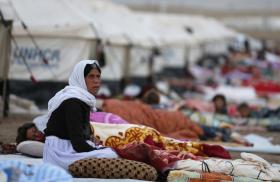Part of a series: Counterterrorism Lecture Series
or see Part 1: U.S. Efforts against Terrorism Financing: A View from the Private Sector
As terrorist groups deepen their involvement in global criminal activities, how is the U.S. government adapting to counter this threat?
On January 19, 2010, Ambassador David Johnson, assistant secretary of state for the Bureau of International Narcotics and Law Enforcement Affairs (INL), addressed a special Policy Forum luncheon at The Washington Institute to discuss the increasing involvement of terrorists in criminal activity and the U.S. government's response. Ambassador Johnson has served as deputy chief of mission for the U.S. embassy in London and as U.S. ambassador to the Organization for Security and Co-operation in Europe. The following is a rapporteur's summary of his remarks during the question-and-answer session.
Download Ambassador Johnson's prepared remarks (PDF)
In recent years, terrorists have increasingly mimicked the activities of conventional criminal organizations. Many terrorist groups -- not only in the Middle East, but also in regions such as West Africa, Latin America, and Central and South Asia -- capitalize on narcotics trafficking and other illicit activities to finance their operations. As the United States and its allies place increased pressure on state sponsors, terrorists have turned to criminal enterprises conducted through porous borders as the most lucrative means of building finances and support. Meanwhile, disintegrating law enforcement and judicial systems have created insecurity and endangered the societies and economies of states that are vital to international stability.
Same Place, Same Time
Sorting out the increasing convergence of criminal and terrorist groups is a pressing challenge for the State Department. Although there is ample evidence of concrete links between such groups, in some cases their tendency to operate in the same regions at the same time is merely circumstantial. Nevertheless, this convergence raises questions and concerns about new terrorist tactics and the geographical range in which they are employed.
In areas like North Africa -- particularly in the Sahel, where border control and law enforcement are weak -- drug and money smuggling, kidnapping, and other crimes provide opportunities for terrorist and criminal groups to benefit from each others' activities. In December 2009, for example, three men claiming to be al-Qaeda associates were charged in New York for attempting to smuggle cocaine through West and North Africa to benefit al-Qaeda in the Islamic Maghreb (AQIM).
In recent years, INL has implemented several programs targeting the roots of the growing terrorist-criminal nexus, and the narco-terrorism nexus in particular: namely, the lack of strong government infrastructure, institutions, and territorial authority in certain jurisdictions. State-building efforts, in contrast to reactionary interruptions of drug shipments, have the chance to halt the problem at the source. At the same time, however, we must consider the practicality of such efforts: how far can territorial authority realistically extend in a given country or region? The State Department and INL should build capacity for state authority where it has traction.
Consider the bureau's strategy in Latin America, where state-specific initiatives such as "Plan Colombia" are beginning to succeed. Although the number of hectares of drug-producing crops in that country has not decreased dramatically, the Colombian government's long-term capacity to control territory and build institutions has shown promise. Centered on air-based efforts to eradicate drug crops, the program has proven to be safer than any ground operation. Going forward, the establishment and maintenance of genuine, effective political leadership will be essential to curbing drug trafficking and other criminal activity in Colombia and Latin America in general.
Dealing with the AfPak Challenge
INL's strategies in Afghanistan and Pakistan are markedly different from those in Latin America. In Pakistan, the bureau's attempts to implement rule of law in the Northwest Frontier Province have succeeded with regard to capacity building and creating opportunities to engage with local communities and provide resources. The United States has had a counternarcotics presence in Pakistan for years, which has contributed to INL's success with a mature and effective program aimed at building subsistence farm communities and providing access to cash markets.
In Afghanistan, unlike in Colombia, INL has not yet pursued air crop eradication. Moreover, Afghanistan's society and infrastructure have lacked the capacity to institute effective counternarcotics or law enforcement programs; there has been no preexisting system on which to build such efforts. The retention rate of law enforcement personnel is significantly low, and there is a glaring need to develop literacy and pedagogical campaigns, an accountable judicial system, and an independent police and paramilitary presence. Accordingly, Afghanistan has posed a greater challenge than other regions. In the short term, a stable law enforcement program that incorporates Afghan members and effectively assumes territorial authority is a key priority in combating the narco-terrorism nexus.
Capacity Building in the Middle East
Many of the State Department's efforts in the Middle East have sought to create or bolster civilian-led law enforcement and judicial institutions. In the West Bank, for example, the United States is helping to build judicial capacity while also conducting specialized training of the Palestinian Security Forces (PASF). The latter effort has been a significant success overall; among other achievements, the PASF was able to provide effective crowd control and law enforcement support during demonstrations against Israel's Operation Cast Lead.
INL's approach in Lebanon has centered on helping the government control its own territory and conducting executive-level training through various leadership programs. As a result, there is a visible, U.S.-influenced law enforcement presence on the streets. At the same time, full territorial authority has not yet been realized, and Lebanon's lawless areas are conducive to both terrorist and criminal operations.
The Bekaa Valley, for example, is a major drug-producing region. Although narcotics themselves do not make up an enormous amount of criminal and terrorist group income, they provide other benefits that must be addressed. Moving drugs across borders helps traffickers establish contacts, compound the area's lawlessness, and gain popular support, whether the enterprise is terrorist or criminal in nature. In addition, these groups often exploit the lack of government control by providing products and services to local communities, further cementing their popular standing.
In Iraq, the United States has had significant success in improving law enforcement. Unlike Afghanistan, Iraq is conducive to implementing effective judicial and security systems -- it had a functioning government in the past, and much of its population is educated. Accordingly, State Department programs are no longer solely instructive, but comprehensive and inclusive of Iraqi input. From 2003 until recently, U.S. personnel had been driving these judicial, security, and development efforts, but as American troop levels draw down, Iraqis are taking on greater roles. Moreover, as the military presence decreases, the State Department presence will increase to fill the gap. So far, the attempt to slowly remove U.S. military personnel from Iraq's systems while building up Iraqi membership has been successful.
Recently -- and especially in the wake of the Christmas Day terrorist plot -- U.S. aid to Yemen has been a prominent topic. Given that country's internal fragility, the State Department understands that any aid must begin modestly. Yemen lacks data exchange capability and control over its borders, especially its long land border. Completely fixing this deficiency would be difficult, if not impossible. Even so, the United States will attempt to provide fingerprint and data exchange capabilities at Yemen's controlled entry points in the coming years, which will at least allow the government to know who is entering by formal means. The extent and form of aid to Yemen will be reassessed as conditions change.
Conclusion
To stay on top of the narco-terrorism nexus and the ties between criminal and terrorist groups, INL must aim to effectively manage programs across borders and better understand money flows -- not only unconventional flows abroad, but also conventional bank flows within the United States. Drug education programs and other demand-reduction efforts in the United States may be effective to some extent, but the worldwide demand for narcotics would outweigh any domestic decrease. In fact, the sums of money being generated from drug trafficking and other criminal activity are large, and growing ever larger, due to the high global demand. Indeed, many fear that this escalation will allow illicit actors to use these funds to produce or procure weapons of mass destruction. We must therefore institute programs that restrict both supply and demand while at the same time addressing the root problems: lawless regions, porous borders, and fragile or nonexistent state infrastructures, all of which help terrorist and criminal groups carry out their activities separately and convergently.
This rapporteur's summary was prepared by Stephanie Papa.





